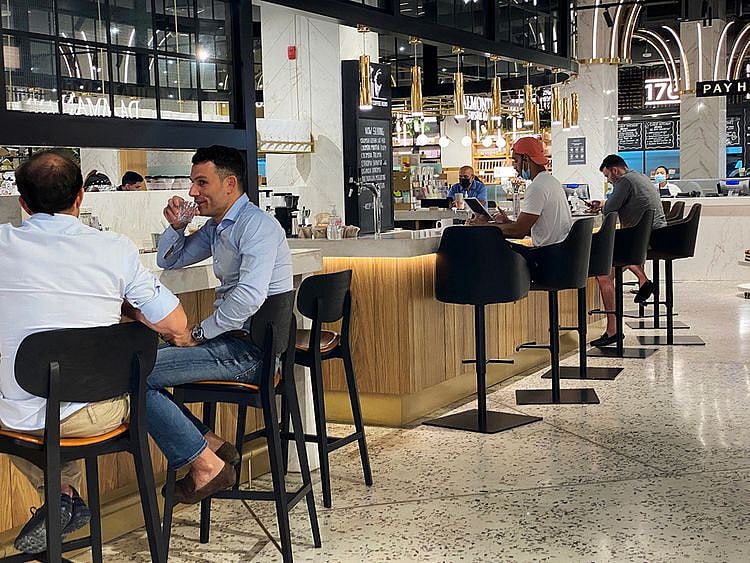Dubai's 'food halls' are proving a less expensive option for F&B businesses
In the last year alone, three different food halls launched in the city

Dubai: Unlike food courts, which are made up of fast-food chains, food halls typically house local F&B concepts, butcher shops and other food-focused boutiques, all under one roof. Think of a food hall as a place where you could pick up artisan bread, high quality cured beef or a bottle of truffle oil while also sipping on your speciality coffee or eating a gourmet meal. But recently, more casual food options are being offered, including piping hot ramen bowls, Currys, casual burgers and even tacos.
If you're from Europe or have travelled there, food halls should not be new to you, but their growing popularity in Dubai has local businesses excited to take part.
Quick to adopt and adapt
“Food halls offer something totally different from your regular food court,” said Reif Othman, chef and co-owner of Kushi by Reif. His restaurant is at Depachika, an upscale food hall at Nakheel Mall. It launched in early January and features marble countertops, good lighting and modern furniture.
Sandy El Hayek, the Food and Beverage Manager at Nakheel Malls, explains the appeal in food halls. “We support both vendors and landlords equally,” she said. “We have no fixed overheads - only a percentage on turnover. “Furthermore, we take responsibility for the bulk of the capital expenditure, so the vendor only needs to bring their specialty equipment and staff on site. This means the vendor has no major start-up or investment costs, which is less risky. We also invest a lot of effort into marketing the destination and the vendors.”
A marked difference
This is where food halls differ quite drastically from the food court leasing model that malls operate on. Food courts have emerged as a cash cow for malls in recent years, which explains why the space dedicated to them has increased. And F&B outlets sign up for that space at fairly high rental terms (especially on the ‘turnover’ clause). Now, if food halls and the more generous lease terms, can offer to revive the local F&B scene – one of the hardest hit by the pandemic – then all the better.
“Opening a standalone restaurant is a different ball game and much riskier, with many factors at play, including location,” according to Othman. “Additionally, there’s the challenge of finding an understanding landlord these days. Sometimes landlords prefer to have an empty unit, rather than lease it out at a more reasonable rent. So, being at a food hall has allowed us to price our high-quality dishes at more reasonable prices. I don’t believe you have to go to a high-end restaurant for great calibre food.”
It’s all in the look and feel
The South Market food hall, which opened in July, sports a more casual environment than at Depachika. It’s an urban space, with exposed ceilings, steel beams, raw timber and concrete features as well as neon signage and street art murals. The 15 eateries offer gourmet burgers, Asian desserts, burritos… and even Egyptian seafood. An advantage during the weekdays is that South Market isn't located inside of a mall, which makes it a bit more of an accessible destination to lunch hour seekers in Dubai’s financial district.
As a result, they see high volumes during the week, especially during lunch or right after work. Weekends on the other hand are a bit calmer. Omar Saeed, a partner at JAX Burgers & Poutine Shop, said: “Starting your own restaurant from scratch involves a lot of moving parts. Since this is our pilot launch for JAX, instead of investing in a standalone building with major fitout works, we decided to join the DIFC Gate Avenue’s South Market Food Hall.
“The advantage is being able to figure out what works for our business and what doesn't, without the distractions normally associated with owning a full-fledged dine-in restaurant. We can focus on making our brand clearly defined.”
Help thy neighbour
An additional - and vital - selling point is that the vendors benefit from their neighbours. When a good mix of offerings come together, vendors have instant and quicker footfall, instead of having to create an individual destination on their own. Another vendor at South Market, Nadine Benchaffai of Burritos Beyond Borders, said: “We decided to open in Gate Avenue, as we wanted to be in the heart of DIFC’s newest food scene. The cool, comfortable surrounding match our food, our vibe, and our team.. we are seeing a steady stream of new and familiar faces every day.”
Even Dubai residents are excited about the emergence of the trend. “I loved the idea of a food hall. It’s a glorified food court with better ingredients and a slightly more complex flavour profile than that of a chicken nugget," Salma El Shahed an avid foodie told Gulf News. "It’s a chance for small restaurants to reach even more people and hopefully rid us of the misery of Big Food."
Another recently opened Food Hall at Al Areesh Club in Festival City is more of a food hall in the traditional sense. Their venue is a modern-day food marketplace offering a live bakery, a butchery, a speciality coffee, a deli, a soft-serve ice cream parlour and seasonal outdoor barbeque. They even plan to offer delivery soon.
While all of Dubai’s food halls offer a similar idea, each one has its own unique execution. Whether you appreciate the finer things, or a dirty burger, one of those food halls is sure to fit your foodie needs.
Sign up for the Daily Briefing
Get the latest news and updates straight to your inbox
Network Links
GN StoreDownload our app
© Al Nisr Publishing LLC 2025. All rights reserved.